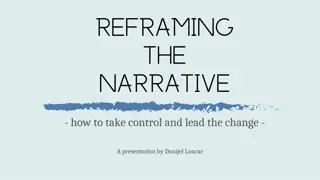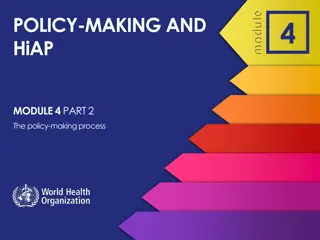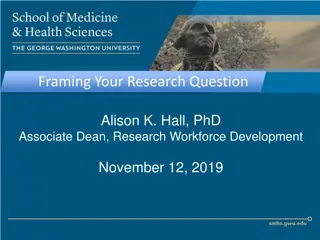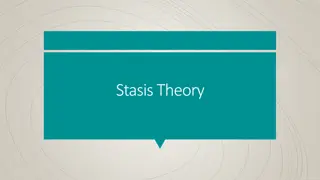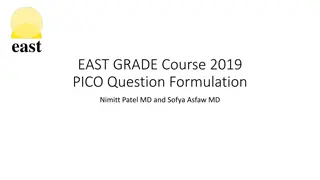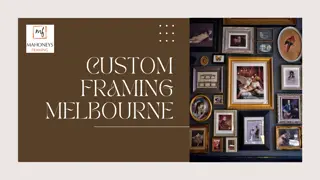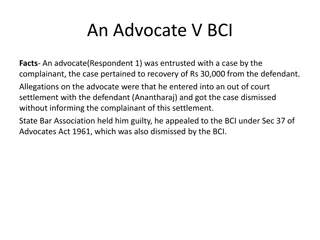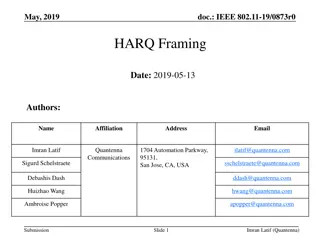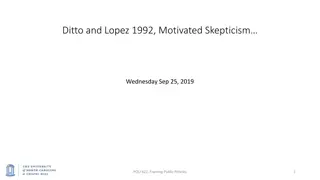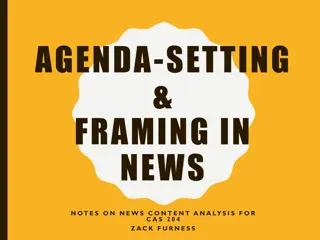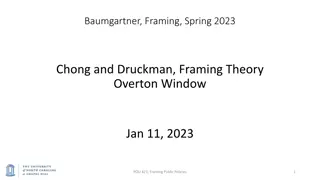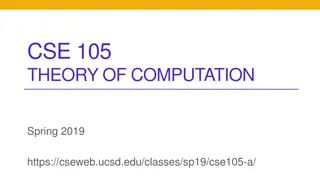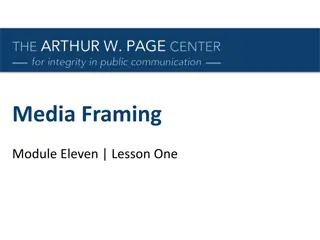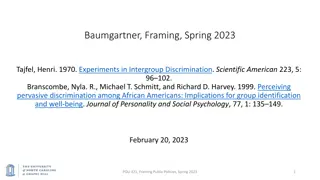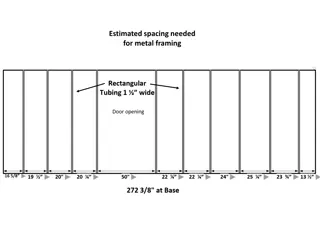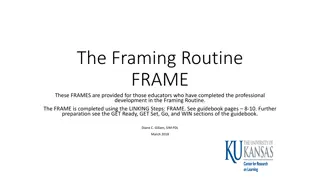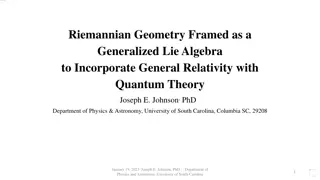Ginzburg Landau phenomenological Theory
The Ginzburg-Landau phenomenological theory explains superconductivity and superfluidity as distinct thermodynamic phases. It focuses on phase transitions characterized by singularities in specific heat at the transition temperature. Derived from BCS theory, it quantifies condensation energy, emphas
1 views • 38 slides
Crystal Field Theory in Transition Metal Complexes
Crystal Field Theory (CFT) explains the colors and magnetic properties of transition metal complexes. It focuses on the energy changes in d-orbitals of metal ions caused by surrounding ligands. This theory, developed in 1929, provides insights into the bonding interactions in complex compounds. The
10 views • 44 slides
LIVEARf-Marketing-Pamplet
\"LIVEARf - Realize, Arts, Frames. Complete Sales Engagement Platform for Wall Art Artists & Framers\nLIVEARf, a SaaS Vertical App focusing on a Complete stakeholder (Customers, Vendors,Partners) Engagement platform exclusively for Wall Art Artists, Custom Framing Merchants Community. Our modules wo
1 views • 1 slides
Evolution of Mathematical Theories and Proof Systems
Development of mathematical theories such as model theory, proof theory, set theory, recursion theory, and computational complexity is discussed, starting from historical perspectives with Dedekind and Peano to Godel's theorems, recursion theory's golden age in the 1930s, and advancements in proof t
1 views • 29 slides
Psychological Theories of Criminality: Understanding the Roots
Psychological theories of criminality delve into the association between intelligence, personality, learning, and criminal behavior. Major theories include Psychodynamic Theory by Freud, Behavioral Theory by Bandura, and Cognitive Theory by Kohlberg. These theories explore how unconscious mental pro
1 views • 20 slides
Empowering Change Through Storytelling and Emotional Framing
Empower change by reshaping narratives and invoking emotions through storytelling. Understand how facts alone may not influence beliefs, and learn to reframe perspectives to drive positive action. Explore the impact of framing on our understanding of nature and the world. Shift focus from loss to lo
0 views • 7 slides
Understanding Policy-Making Process for Health Improvement
Policy-making involves defining policy, recognizing its complex nature, identifying windows of opportunity, and framing health issues. The policy-making cycle includes stages like agenda setting, formulation, and implementation. Alignment of problems, policies, and politics is crucial for effective
1 views • 12 slides
Understanding the Theory of Firms: Neoclassical vs. Modern Approaches
The theory of firms is explored through the Neoclassical and Modern perspectives. Neoclassical theory focuses on profit maximization, while Modern theory delves into managerial, principal-agent, and transaction cost theories. The discussion covers criticisms of Neoclassical theory and the essential
1 views • 79 slides
Framing Research Questions for Effective Study Design
Beginning a research project involves framing a clear question that leads to a hypothesis, aims, and approach. This process requires careful consideration of which questions to pursue and how to develop them into a study. From tentative questions to testable statements, refining the research questio
4 views • 22 slides
Understanding Stasis Theory in Argumentation
Stasis theory in argumentation helps identify the point of disagreement by categorizing issues into facts, definition, quality, and policy. It assists in framing debates and responses to opponents by asking questions about the nature, seriousness, and plan of action regarding the problem or issue at
1 views • 15 slides
Theories of Causation in Psychological and Social Sciences
Overview of theories of causation categorized into psychological, social psychological, and sociological perspectives. Psychological theories focus on instinctive, biological, and psychological qualities of abusers, including Attachment Theory, Psychodynamic Theory, Social Learning Theory, and Situa
0 views • 15 slides
PICO Question Formulation in Health Care: A Practical Guide
Framing a clear and focused health care question is essential for effective decision-making. The PICO framework - Population, Intervention, Comparison, Outcome - provides a structured approach to formulating questions that lead to actionable recommendations. Guidelines for framing questions based on
3 views • 12 slides
Understanding Political Theory through a Contextual Approach
Exploring G.H. Sabine's perspective on political theory through a contextual approach, emphasizing the importance of historical context and societal influences. Sabine argues that while political theory evolves with its contemporary politics, it should be analyzed within its specific time and social
0 views • 9 slides
Evolution of Light Theory: From Wave Theory to Quantum Theory
At the turn of the century, the discovery of the photoelectric effect challenged the wave theory of light, leading to the development of the quantum theory by Max Planck and Albert Einstein. This new theory introduced the concept of discrete energy units known as quanta, bridging the gap between wav
1 views • 62 slides
Custom Framing Melbourne
Mahoneys Framing, a leading custom framing business in Melbourne, offers premium framing services to preserve your cherished memories and artworks. For more info visit (www.mahoneysframing.com.au)
18 views • 7 slides
Advocacy and Ethics: A Case Study on Professional Misconduct
An advocate faced allegations of entering into an out-of-court settlement without informing the complainant in a recovery case. The advocate was held guilty by the State Bar Association and the Bar Council of India (BCI). Issues of professional misconduct, negligence, and the need for specific charg
4 views • 6 slides
Enhancing HARQ Framing for IEEE 802.11 Standards
Hybrid-ARQ (HARQ) is a candidate topic for TGbe presentations in IEEE 802.11 standards. Despite previous unsuccessful attempts, there is renewed interest in enabling HARQ through framing support. This document discusses the importance of presenting HARQ framing, outlining the necessary information a
1 views • 7 slides
Dp-branes, NS5-branes, U-duality, and M-Theory Overview
Overview of Dp-branes, NS5-branes, and U-duality derived from nonabelian (2,0) theory with Lie 3-algebra. Introduction to M-theory, including M2-branes and M5-branes in the strong coupling limit. Discussion on BLG theory, Lorentzian Lie 3-algebra, and the ABJM theory for M2-branes.
1 views • 32 slides
Understanding Time-Independent Perturbation Theory in Quantum Mechanics
Perturbation theory is a powerful tool in solving complex physical and mathematical problems approximately by adjusting solutions from a related problem with known solutions. This theory allows for more accurate approximate solutions by treating the difference as a small perturbation. An example inv
0 views • 19 slides
Ethical Theories: Divine Command vs. Virtue Theory Explained
Divine Command Theory asserts that morality is derived from God's commands, contrasting with Virtue Theory which focuses on developing moral virtues to achieve human flourishing and excellence. Divine Command Theory relies on religious texts, while Virtue Theory emphasizes the cultivation of virtues
0 views • 24 slides
Ship Structural Framing Systems in Nautical Science
Understanding ship structural framing systems is crucial in naval architecture. The text explores transverse and longitudinal framing systems, discussing their advantages, disadvantages, and contributions to ship strength. It highlights how these systems help in overcoming various stresses on a ship
0 views • 16 slides
Effective Messaging Strategies for Health Promotion Training
Explore the importance of values-based messaging, framing objectives, and the impact of framing in communication strategies for public health and community development. Learn about the seven stages of frameworks learning and how to effectively deliver messages to support policy changes. Gain insight
0 views • 38 slides
Understanding Fermi Liquid Theory in Interacting Fermion Systems
Fermi liquid theory, also known as Landau-Fermi liquid theory, is a theoretical model that describes the normal state of metals at low temperatures. Introduced by Landau and further developed by Abrikosov and Khalatnikov, this theory explains the similarities and differences between interacting ferm
0 views • 23 slides
Various Types of Precision Measuring Tools
Explore a range of precision measuring tools such as micrometers, vernier calipers, dial calipers, fiberglass tape, steel tape, measuring wheel, try squares, framing squares, rafter squares, combination squares, sliding "T" bevel, depth gauge, and inside calipers. These tools cater to different meas
0 views • 38 slides
Understanding Motivated Skepticism in Public Policy Framing
Exploring how individuals display motivated skepticism in evaluating information related to public policies and medical news, influencing their decisions and perceptions. The phenomenon is examined through studies highlighting biases towards preferred information, impacting how individuals rate inte
0 views • 9 slides
Computational Learning Theory: An Overview
Computational Learning Theory explores inductive learning algorithms that generate hypotheses from training sets, emphasizing the uncertainty of generalization. The theory introduces probabilities to measure correctness and certainty, addressing challenges in learning hidden concepts. Through exampl
0 views • 43 slides
Automata Theory and Theory of Computation Overview
This course overview covers concepts in automata theory and theory of computation, including formal language classes, grammars, recognizers, theorems in automata theory, decidability, and intractability of computational problems. The Chomsky hierarchy, interplay between computing components, modern-
0 views • 42 slides
Theories of Interest in Microeconomics II
Explore various theories of interest in economics, including the Classical Theory, Liquidity Preference Theory by Keynes, Productivity Theory, Abstinence Theory, Time-Preference Theory, Fisher's Time Preference Theory, and the Loanable Fund Theory. These theories offer different perspectives on the
0 views • 6 slides
Agenda-Setting & Framing in News Content Analysis
Theory of agenda-setting and framing in news content analysis explores how mass media influence public opinion by shaping what topics are deemed important. Developed by McCombs and Shaw, the theory highlights the media's ability to transfer salience of news items to the public agenda. Initial findin
0 views • 24 slides
Detailed Steps in Building a Popsicle Stick House
Explore the construction process of a Popsicle stick house, from laying the foundation to framing walls and installing roof frames. Detailed images and descriptions guide you through each step, including floor framing, wall construction, and roof assembly, offering insights into building practices.
0 views • 14 slides
Exploring the Evolution of Atomic Theory
Delve into the historical journey of atomic theory starting from Democritus and Aristotle's views to modern advancements proving some aspects of Dalton's theory incorrect. Learn about key laws and theories such as the Particle Theory of Matter, Dalton's Atomic Theory, and JJ Thomson's discoveries, s
0 views • 30 slides
Understanding Framing Theory in Public Policy Analysis
The provided text offers insights into framing theory within the context of public policy studies. It discusses key concepts such as the multiple perspectives through which issues can be viewed and the factors influencing framing effects. The content also touches on practical aspects like tackling o
0 views • 32 slides
Theory of Computation: Decidability and Encoding in CSE 105 Class
Explore the concepts of decidability, encoding, and computational problems in CSE 105 Theory of Computation class. Learn about decision problems, encodings for Turing Machines, framing problems as languages of strings, and examples of computational problems and their encodings. Gain insights into th
0 views • 26 slides
Understanding Media Influence: Lesson on Agenda Setting and Framing Principles
Delve into the power of media in shaping perceptions and agendas with this insightful lesson. Explore the concepts of media agenda setting, framing principles, and the impact of different news story framings. Reflect on how media influences what we think about rather than dictating what opinions to
0 views • 10 slides
Macromechanical Analysis of Lamina and Tsai-Hill Failure Theory Overview
The Tsai-Hill failure theory is based on the strengths of a unidirectional lamina, incorporating longitudinal and transverse tensile and compressive strengths, as well as in-plane shear strength. This theory, derived from the distortion energy theory, provides criteria for determining lamina failure
0 views • 15 slides
Understanding Policy Change Through Framing in Public Policies
The study of framing in public policies delves into the dynamics of policy change and how different perspectives influence our understanding of complex issues. This process sheds light on the cognitive aspects underlying political ideologies and the sudden shifts in frames over time. An upcoming ter
0 views • 15 slides
Best Framing Services in Jane and Finch
If you want the Best Framing Services in Jane and Finch, visit Hidden Gem Carpentry Inc. They specialize in interior renovations but can provide various custom woodworking projects. Do not hesitate to call us for a free no-obligation consultation, av
2 views • 6 slides
Comprehensive Metal Framing and Building Support Specifications
Detailed images and information on estimated spacing for metal framing, metal framing needed for the third floor barrel piece, third floor barrel section and building wall metal support beams, and specifications for window panel cutouts.
0 views • 4 slides
Unlocking the Framing Routine: Key Insights for Educators
Explore the essential steps and insights of the Framing Routine for educators who have completed professional development. Learn how to frame main ideas and essential details using linking steps and understand the significance of each element. Dive into the So What aspect to grasp the deeper underst
0 views • 6 slides
Incorporating General Relativity into Quantum Theory through Riemannian Geometry
Framing Riemannian Geometry as a Generalized Lie Algebra to combine General Relativity with Quantum Theory. The proposal extends Heisenberg Algebra to incorporate a more general geometry, allowing for a function of position in commutator relationships. The discussion covers historical developments,
0 views • 50 slides





